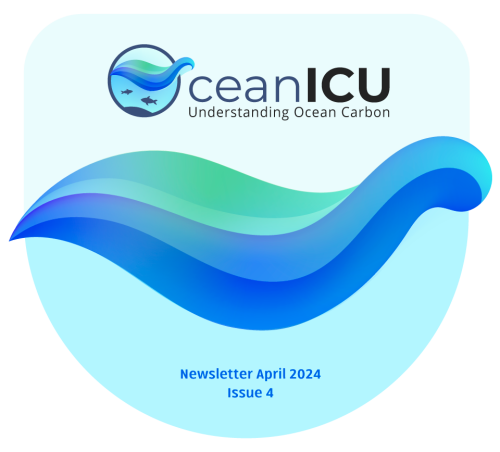
In this edition:
OceanICU is a five-year project, funded by Horizon EU and UK Research and Innovation, that seeks to gain a new understanding of the biological carbon pump and its processes to provide fundamental knowledge and tools to help policy makers, regulators and Ocean industry—fishing and mining, along with the wider blue economy—manage and understand the impact of their actions on Ocean carbon. This will ultimately lead to a better approach for addressing climate change in alignment with the EU Green Deal to reduce the net emissions of greenhouse gasses to Zero by 2050.
A Note from our Coordinator Richard Sanders
Hi everyone,
Wow, doesn’t time fly? It seems only yesterday that the OceanICU consortium met in Copenhagen to plan the first phase of the project, but that was actually over a year ago. Since then all the work packages have made great progress initialising themselves and the second Annual Meeting, recently held online, provided a really good overview of where we are. I think the major challenge we are now facing concerns linking activity across the project to bring the Decision Support tools to life and we are looking forward to tackling this as the project progresses this year.
We will continue to host informative OceanICU webinars, focused on project research, throughout this year. You can check out the video recording if you missed March’s event (Ocean Uptake of Antropogenic Carbon) and do register for the upcoming April (Ocean Acidification) and May (Industrial Carbon and Mining) webinars. See the webinar section of this newsletter for the links.
We look forward to updating you on the ongoing activity of the project in the next newsletter due out in July. In the meantime, if you are interested in joining the OceanICU dialogue, email us or fill out the stakeholder sign-up.
Richard Sanders
OceanICU Project Coordinator
NORCE
Bergen, Norway

OceanICU Annual Meeting
On 12th December, OceanICU had the privilege of participating in the closing session of the Virtual Ocean Pavilion at the COP 28 Climate Talks in Dubai: Managing and protecting ocean spaces for climate, biodiversity and people by 2030.
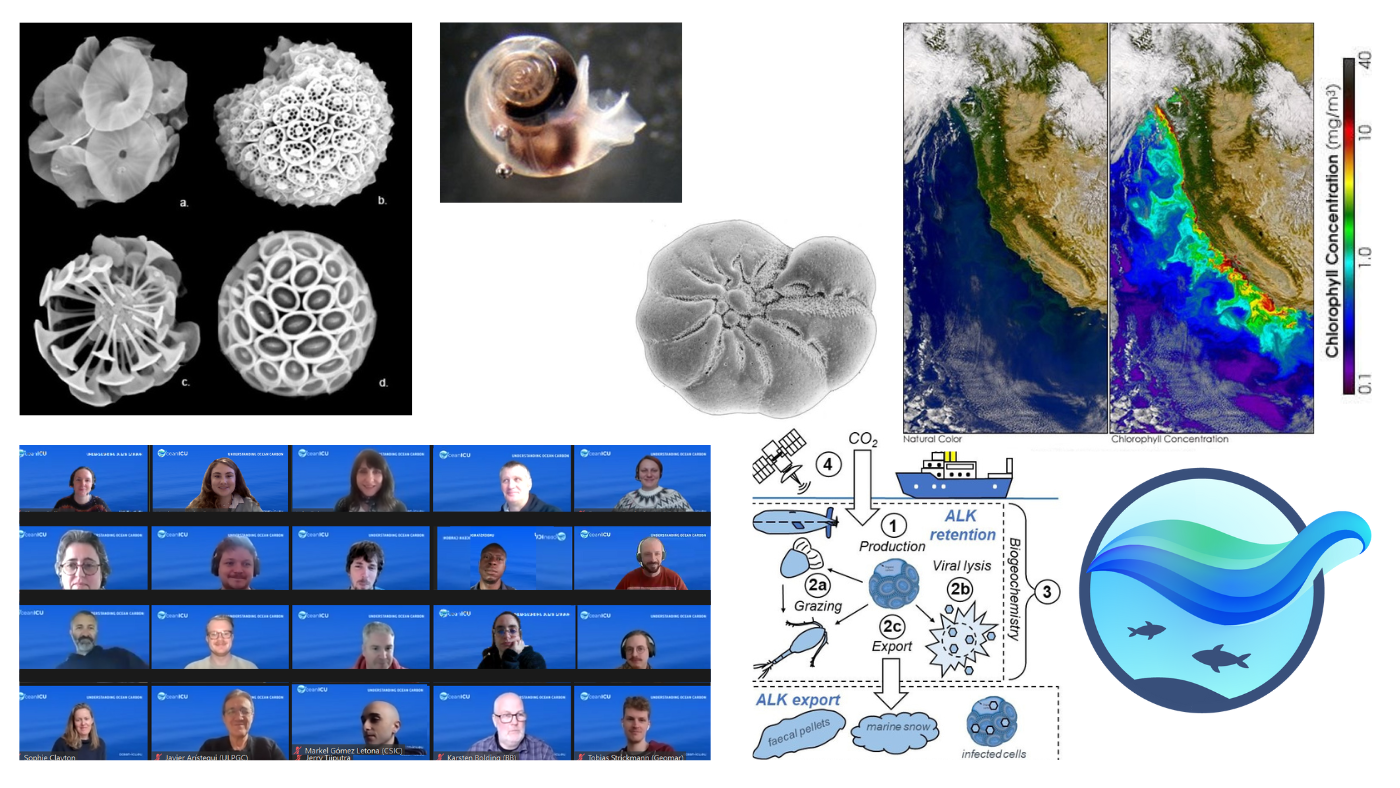
The 2024 OceanICU Annual Science Meeting took place virtually, 11-15th of March, offering a positive view of progress made during the first year and a robust platform for discussions among partners across various scientific domains concerning ocean carbon processes. Through a series of comprehensive sessions, work packages presented the latest research, as well as updates on their collaboration with other work package groups.
Key take-aways included the need for building activity chains across the project, linking new process knowledge to models, the importance of continuing dialogue with stakeholders, defining user and technical requirements for the decision support tools, identifying case studies and understanding OceanICU links with other key research programmes such as APERO, Sea02CDR, BioCarbon, IOCR and EXPORTS initiatives.
Addressing the evolving challenges in our ocean, such as deep-sea mining, expanding offshore energy, fishing, and climate change impacts, demands data for informed decision-making. OceanICU’s mission to bridge knowledge gaps in ocean carbon processes aims to equip policymakers with the necessary tools to sustain marine ecosystems. As the meeting concluded, partners expressed a collective commitment to advancing our understanding of ocean carbon and fostering interdisciplinary collaboration to tackle climate change challenges.
The next Annual Meeting will be in Sopot, Poland hosted by IOPAN, 19-23 of May.
For a summary of specific research highlights from each work package click on the link below.

WEBINAR 4: Will the ocean uptake of anthropogenic carbon dioxide (CO₂) continue primarily as an abiotic process?

Judith Hauck (AWI) examined whether the ocean uptake of anthropogenic CO2 is primarily an abiotic process. She argued that the net anthropogenic CO2 uptake remains a small residual amidst the backdrop of larger background fluxes and emphasised that the natural carbon cycle is influenced by a combination of biological, physical, and chemical factors, while the uptake of anthropogenic CO2 is predominantly an abiotic (physical-chemical) response to atmospheric CO2 rise.
Jamie Shutler (University of Exeter) explored whether biology plays a role in controlling the oceanic carbon sink and what the potential is for this role to evolve over time. He concluded that biological processes have shaped the contemporary conditions under which carbon exchange occurs.
A lively discussion followed with many good questions from the audience. For those interested in learning more, the webinar recording and presentation slides can be accessed on our website.
Stakeholder Workshops with the Fishing Industry
OceanICU held the first two online stakeholder workshops of the project during the first quarter of 2024. On the 27th of February, the first workshop focussed on high seas fisheries; the second focussed on shelf seas fisheries, specifically the Celtic Seas, and was held on the 27th of March. A total of 36 unique participants attended the workshops. These participants represented fishers and producers, advisory bodies, management and responsible authorities, NGOs and researchers.
During the workshops, the OceanICU project was presented, along with background knowledge on ocean carbon and fisheries. The results of a pre-workshop questionnaire were presented to attendees, and Q&A sessions encouraged active discussions. In addition, attendees participated in an exercise to co-produce a mental model of the fisheries-carbon system, including identifying the elements that should be included in such a system, and the types of links and interactions between those elements. This exercise helps us to understand the linkages between the ocean carbon and society, through human activities and ecosystem services.
Open and engaged discussions led to the identification of some key knowledge gaps and areas of interest or needs in relation to ocean carbon. Going forward, OceanICU will use this information to develop future scenarios, inform management/policy questions, and provide input to the development of decision support tools and outputs from the project. We also intend to build on the outputs of the workshops with future stakeholder engagement events and workshops. Further detail on the workshops will be given in the forthcoming Deliverable 8.2 of the project. To get involved, you can sign up to the stakeholder panels here.
WEBINAR 5: Ocean Acidification - POSTPHONED

Register now for our webinar on the 24th of April to learn about ocean acidification and the global carbon cycle. Attend the live session and take this unique opportunity to ask questions and gain valuable insights into this pressing environmental challenge from leading expert Dr. Jan Taucher from GEOMAR Helmholtz Centre for Ocean Research Kiel and PhD Student from NUIG Galway Delon Earle, and moderated by Prof. Alex J Poulton from Heriot-Watt University.
WEBINAR 6: Industrial Carbon and Mining

Dr. Matthias Haeckel from GEOMAR Helmholtz Centre for Ocean Research Kiel and Dr. Karline Soetaert Professor at the Royal Netherlands Institute for Sea Research will host a webinar on Carbon and Industrial Processes: Deep Sea Mining/ bottom-trawling. Register Today, Save the Date and Stay tuned for more news.

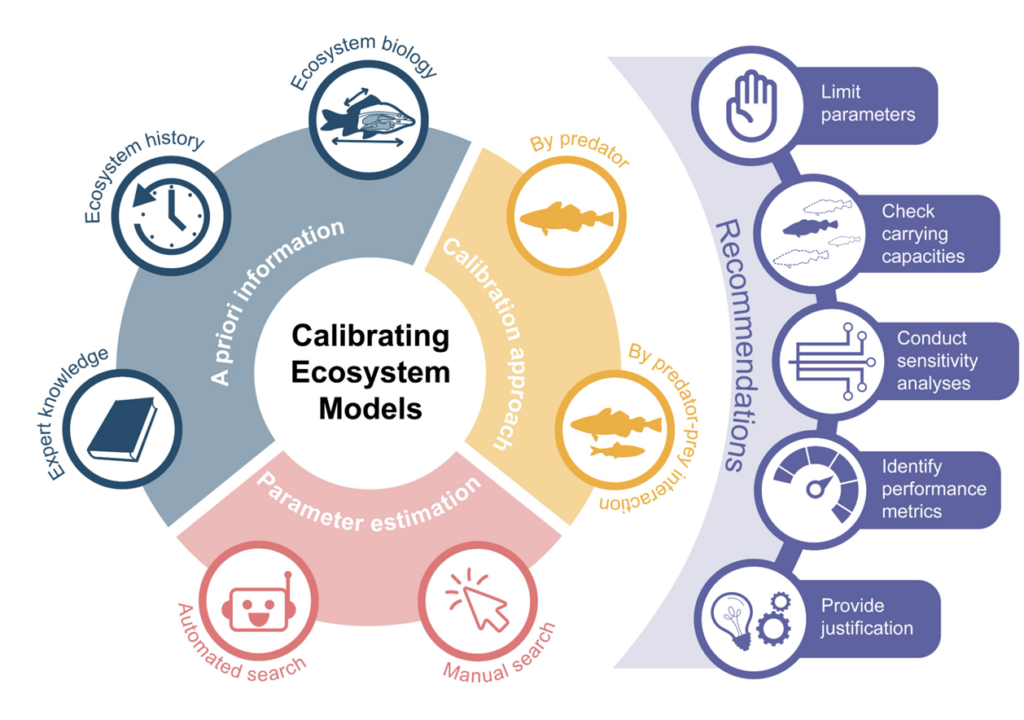
Calibrating ecosystem models to support ecosystem-based management of marine systems
Decision-makers are increasingly exploring how ecosystem models can inform management and policy in a rapidly changing environment. OceanICU colleague Jacob Bentley (Natural England), along with co-authors, explore calibration approaches in the article: “Calibrating ecosystem models to support ecosystem-based management of marine systems”. The article was published by ICES Journal of Marine Science as an Editor’s Choice.
Effect of sampling bias on global estimates of ocean carbon export
Shipboard sampling of ocean biogeochemical properties is necessarily limited by logistical and practical constraints. As a result, the majority of observations are obtained for the spring/summer period and in regions relatively accessible from a major port.
This limitation may bias the conceptual understanding we have of the spatial and seasonal variability in important components of the Earth system.
Read the recent paper by Stephanie Henson (NOC), and co-authors for a discussion on the effect of sampling bias on global estimates of ocean carbon export.
Total population reports are ill-suited for global biomass estimation of wild animals
The role marine mammals play in the ocean carbon cycle is unclear. Partly this reflects uncertainty over the biomass of wild mammals, something our OceanICU colleague Fabio Berzaghi (WMU) and co-authors address in the new paper,

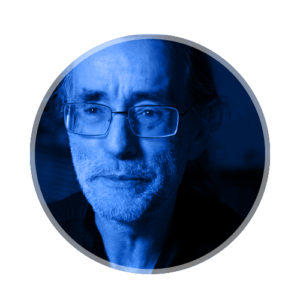
Congratulations to Professor Dave Reid (MI) who has recently been appointed Chair of the Science Committee at ICES. As work package 5 lead, Dave has been a dedicated member of our OceanICU consortium and we thank him for all of his great contributions. We look forward to continuing our collaboration with Dave on our mission to understand ocean carbon processes in his new role at ICES.
EGU 2024
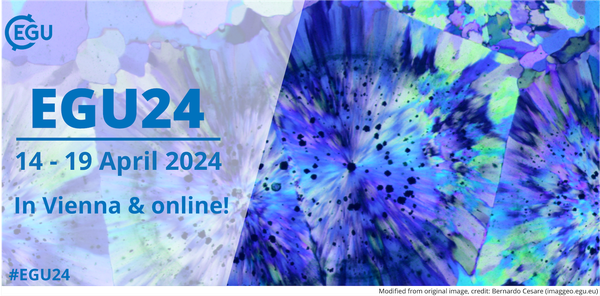
OceanICU will host a session at this year’s EGU in Vienna. If you are attending, check out the oral and poster presentations by OceanICU partners.
Stephanie Henson will present Future Trends and Climate Feedbacks of the Biological Carbon Pump. EGU24-2879 | Orals | OS3.2 | Fridtjof Nansen Medal Lecture
Wed, 17 Apr, 12:00–12:30 (CET) Room L3 | More details here.
Richard Sanders will present a poster, Temperature vs Ecosystem Structure Control over Remineralisation Length Scale of Sinking Particles in the Global Ocean
EGU24-6054 | Posters on site | OS3.2 | More details here.
Fabio Berzaghi has a poster and will present poster, Better Integration of Nutritional Quality of Plants in Ecological Research EGU24-5592 | ECS.
Posters on site | BG3.7
Thu, 18 Apr, 10:45–12:30 (CET) Hall X1 | X1.37 | More details here.
Presentation: Distribution and Valuation of the Biological Carbon Pump and its Carbon Sequestration
Wed, 17 Apr, 11:00–11:10 (CET) Room L3 EGU24-723 | ECS | Orals | OS3.2
More information here.
The OceanICU video Understanding Ocean Carbon will be featured in the GeoCinema area of the Art-Science gallery in the virtual conference platform. If you are a registered attendee, please check it out.
Oostende Declaration
OceanICU scientists joined more than 100 stakeholders in the formation of this vital declaration calling for concerted international and intergovernmental efforts to create a resilient and sustainable surface ocean carbon observing system. The declaration was released in January. Read it here.

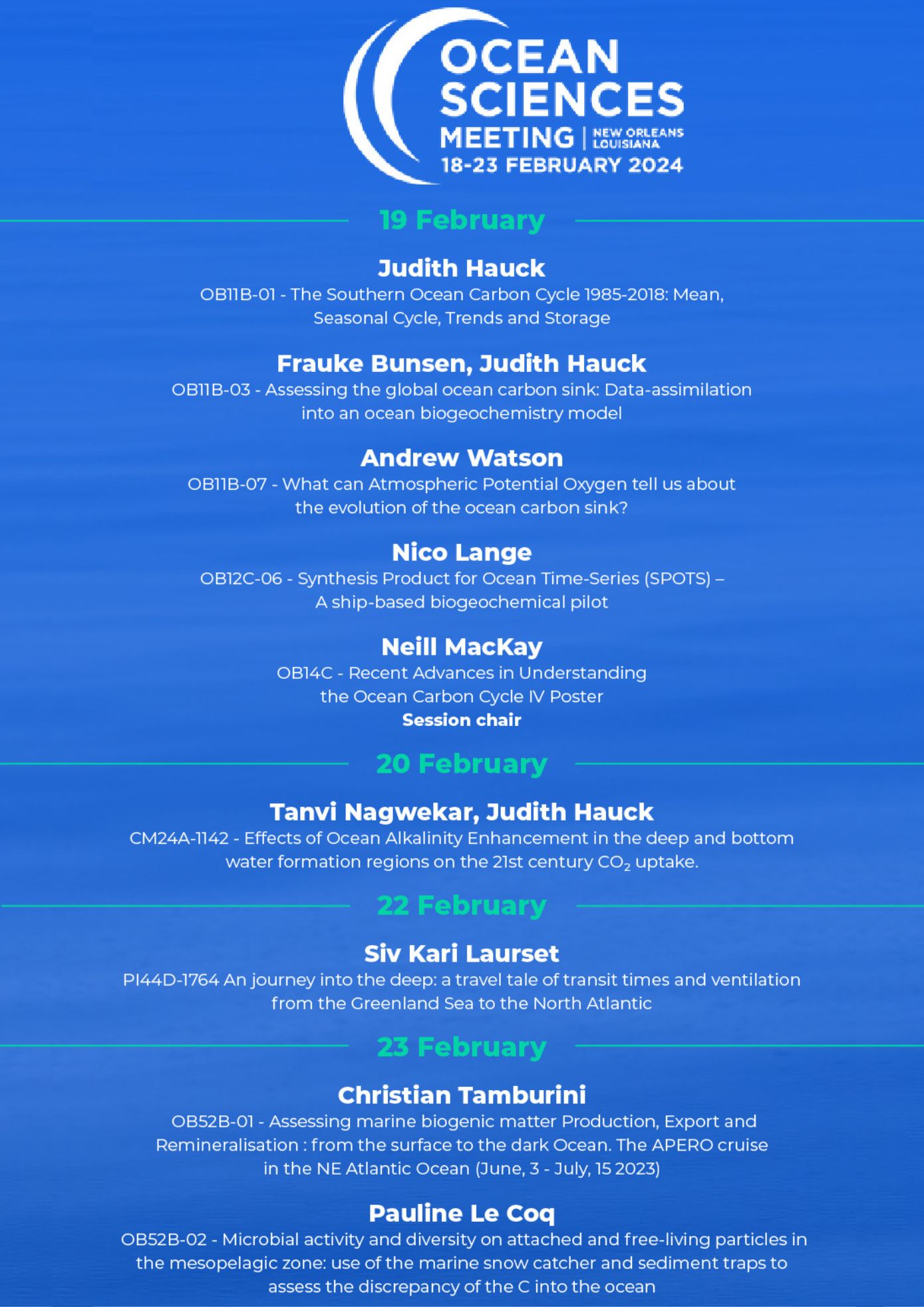
Ocean Sciences Meeting, AGU
Ocean Sciences Meeting took place the 18-23 of February as part of the American Geophysical Union Conference in New Orleans, with almost 6,000 attendees. It was a successful week of knowledge sharing and celebrating science. Several OceanICU partners presented work in support of understanding ocean carbon processes. Among them were: Judith Hauck (AWI), Andrew Watson (University of Exeter) , Nico Lange (NORCE) , Neill MacKay (University of Exeter) , Tanvi Nagwekar, Siv Kari Lauvset (NORCE), Christian Tamburini (CNR) and Pauline Le Coq (CNR).
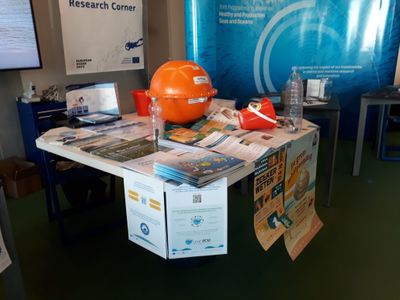
Ocean Literacy in Action Event
OceanICU had a presence at the Ocean Literacy in Action event 8th of March. Visitors scanning the QR code on flyers were taken to a special landing page featuring curated articles and information for a non-technical audience wishing to expand their knowledge of ocean observation and to read the personal experiences of OceanICU scientists in blogs and articles. During the event, the OceanICU short video, Understanding Ocean Carbon was featured in a video wall screening in the lunch area. If you haven’t seen it yet, check it out on the left.

Ocean Decade Week
8-12 April 2024
Barcelona, Spain
Fabio Berzaghi will present: Distribution and Valuation of the Biological Carbon Pump
https://oceandecade-
OceanICU Webinar 5: Ocean Acidification
24 April, 15:00 (CET)
Registration here
EGU 2024 Conference
14-19 April
Vienna, Austria
OceanICU Webinar 6: Industrial Processes
May 2nd, 15:00 (CET)
Registration here
Digital Ocean Forum 2024
13 June
Brussels and Online
Stay updated with the latest news and information about events
Follow us on social media
And remember, if you’d like to join our mission to improve carbon understanding for a healthy and resilient Ocean and sustainable blue economy, please fill out the Stakeholder Sign-Up Sheet.
